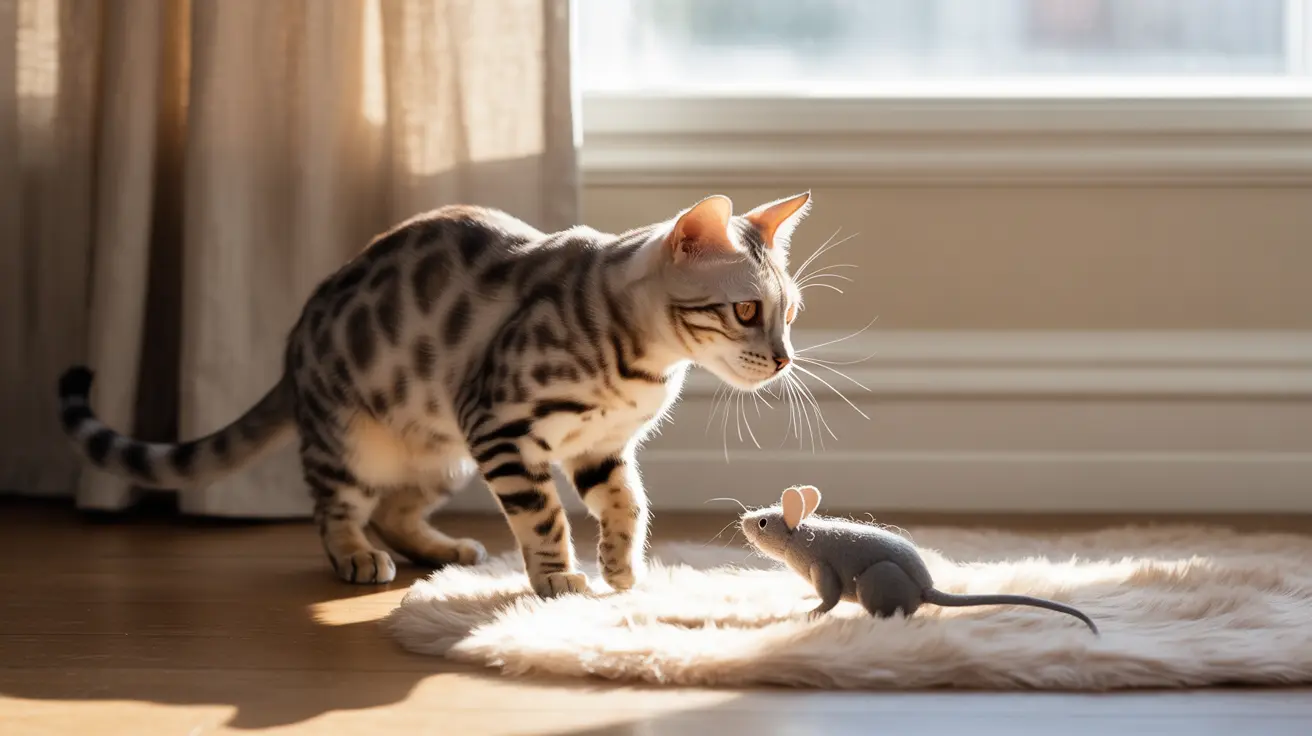猫 狩り 行動 進化の起源
猫のネズミ狩り能力は、その進化の歴史に深く根ざしています。現代の家猫はアフリカヤマネコ(Felis silvestris lybica)を起源としており、この種は小さな獲物を狩ることに特化したハンターとして進化しました。約12,000年前に人間が農業を始めた際、これらの熟練したハンターは穀物貯蔵場所周辺の齧歯類の個体数を制御する理想的な役割を見つけました。
この互恵的な関係が猫の家畜化をもたらしましたが、重要なのは彼らの狩り本能(猫 狩り 本能)が損なわれなかったことです。多くの他の家畜とは異なり、猫はその捕食本能を抑えるために選択的に繁殖されなかったため、今日の家猫でもこれらの本能が自然に残っています(家猫 狩り 野生の名残)。
猫 狩り行動のメカニズムを理解する
猫は完全肉食動物であり、動物組織にしか含まれない栄養素を必要とします。この生物学的必要性は鋭い視覚や聴覚、素早い反射神経や収納可能な爪といった生理機能全体に影響を及ぼしています。これらの適応は、食料が必要かどうかにかかわらず、猫を狩りに最適な存在にしています。
狩りの一連の行動—忍び寄り、追跡し、飛びかかり、獲物を仕留める—は、猫の脳内で快感をもたらすホルモンの放出を引き起こします。この神経報酬システムにより、猫は十分に餌をもらっていても狩りを続けます。つまり、猫 ネズミ 食べないのに狩る理由は、狩り行動そのものが彼らにとって満足感のある楽しい活動だからです(猫 嬉しい時の行動)。
猫 狩りの習性 解説:早期学習の役割
狩りは本能的なものですが、猫がネズミを上手に捕まえるかどうかは、しばしば幼少期の経験に依存します。子猫は生後6〜12週の間に母猫から狩りの技術を学びます。この重要な期間に、母猫は通常、生きた獲物を子猫に持ち帰り、忍び寄り方や捕まえ方、仕留め方を教えます(猫 狩り 行動 いつから)。
この初期訓練を受けていない猫も狩り行動を示すことはありますが、実際に獲物を捕まえる成功率は低い傾向にあります。これが、猫の狩り 失敗する理由の一つであり、なぜ家猫間で狩猟能力に差が出るかを説明しています(猫 狩りの訓練期)。
猫 狩り 行動と健康リスク
猫の狩り本能は自然なものですが、ネズミ狩りには健康上のリスクが伴います。ネズミは猫や人間に影響を及ぼす寄生虫や病気を持っている可能性があります。また、ゴキブリなどの毒餌を摂取したネズミを猫が捕まえた場合、重篤な中毒のリスクがあります。
室内飼いの猫に対しては、獲物の動きを模したインタラクティブなおもちゃを使った遊びを通して狩り本能を満たすことが推奨されます。こうした遊びは、猫の精神的及び身体的刺激をもたらし、実際の生きた獲物を狩ることに伴う危険を避けることができます(猫 狩り 欲求 満たす方法、猫 狩り 本能 遊びで満たす、猫 狩りごっこ おすすめおもちゃ)。
よくある質問
猫はなぜネズミを狩るのですか?
猫は完全肉食動物であり、捕食本能(猫 狩り 本能)によって動機づけられています。狩りは生存のためだけでなく、行動そのものが快感を伴うため、本能的に狩りを行います(猫 本能的 行動 解説)。
猫がネズミを食べずに殺すのはなぜですか?
狩り行動は食事のためだけでなく、快感や遊びの一環として行われることがあります。そのため、猫がネズミを食べないのに狩る理由は、狩猟行動自体が楽しい行動だからです(猫 ネズミ 食べないのに狩る)。
家で飼っている猫にも狩り本能は残っていますか?
はい、家猫にも野生の名残として狩り本能はしっかり残っています。これは長い進化の過程で育まれた本能であり、生活環境にかかわらず消えません(家猫 狩り 野生の名残、猫 狩り本能 なぜ残る)。
猫の狩り行動はどのように身につくのですか?
子猫の頃の母猫からの狩りの指導が重要です。6〜12週齢の間に母猫が生きた獲物を使い、狩りの技術を教えます。この時期を逃すと狩りの成功率が下がります(猫 狩り 行動 いつから、猫 狩りの訓練期)。
猫がネズミを家に持ち帰る理由は何ですか?
猫が捕まえたネズミを持ち帰るのは、自分の縄張りに獲物を持ち込む本能的な行動です。母猫が子猫に狩りを教える際も、獲物を持ち帰るため、これがその名残とも考えられます(猫が捕まえたネズミ 持ち帰る理由)。
猫の狩り本能を安全に満たす方法はありますか?
狩りの欲求を満たすために、動きを模したおもちゃでの遊びやパズルフィーダーなどを使用し、インタラクティブな遊びを取り入れることが推奨されます。これにより、猫は精神的・身体的に刺激を受けつつリスクを避けられます(猫 狩り 欲求 満たす方法、猫 狩猟本能 抑えるには)。
猫が狩りごっこをする際におすすめの遊び方は?
ネズミの動きを模したおもちゃを使い、猫の狩猟本能を刺激する遊びが効果的です。定期的に遊びの時間を設けることで、猫の本能的な狩り行動と遊びの違いを活かした健康的な刺激を与えられます(猫 遊び 狩り 違い、猫 狩りごっこ おすすめおもちゃ)。
猫が狩りで獲物と遊ぶのはなぜですか?
獲物と遊ぶ行動は、安全に獲物を評価したり、狩りの技術を練習したり、獲物を疲れさせて負傷のリスクを抑える目的があります(猫 狩りの習性 解説)。
猫がネズミを捕まえることによる健康リスクはありますか?
主な健康リスクは、回虫やトキソプラズマ症などの寄生虫感染、細菌感染、そして鼠剤を摂取したネズミによる二次中毒の可能性です。特に屋外猫の場合、定期的な獣医の検診と予防措置が重要です(猫 狩り 行動と健康リスク)。
猫の狩り本能はしつけや訓練で抑えられますか?
猫の狩猟本能は本質的に強いため完全に抑えるのは難しいですが、適切な遊びや環境管理によって狩り行動をコントロール・満たすことが可能です(猫 狩り本能 なぜ残る、猫 狩り欲求 どう対応する)。
猫が狩りを失敗する・うまくできない原因は何ですか?
主に幼少期の狩り訓練不足や経験不足によるもので、早期に母猫から学ぶ狩りの技術が身についていないためです(猫 狩り 失敗する理由、猫 狩りの訓練期)。






